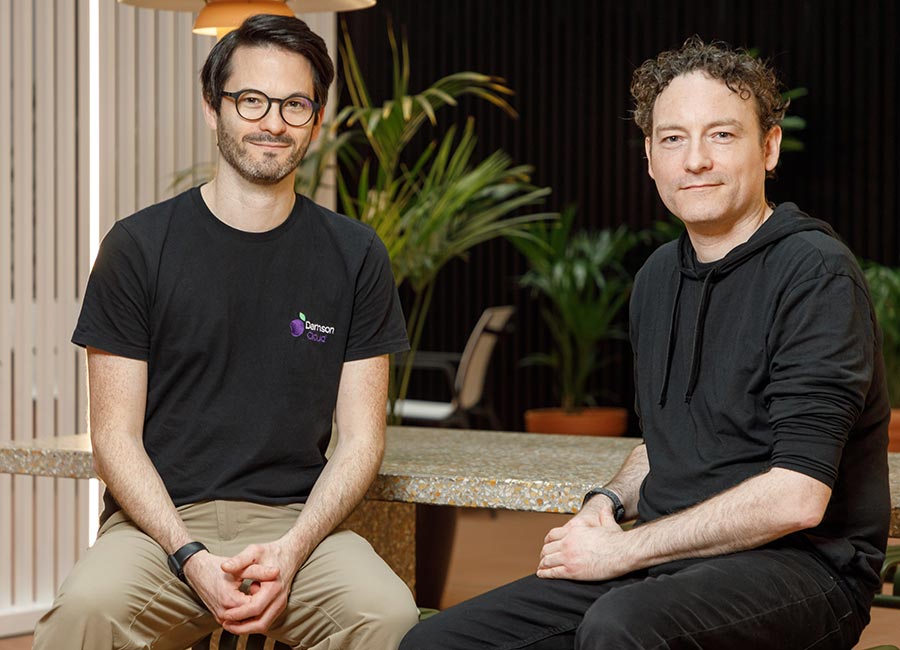The pandemic has been good to Damson Cloud. The Google Workspace applications vendor, founded by brothers Fintan and Donal Murphy, has seen a 270% increase in revenue since Covid-19 forced organisations to transition to remote working and rethink their technology.
Having previously relied on contractors, the Dublin company says it is recruiting staff and is on track to achieve turnover of €5m this year. The driver is client companies establishing hybrid working practices for the long-term and embracing cloud-based remote working.
CEO Fintan Murphy (39) established Damson in 2005 as a traditional IT maintenance business after taking a break from his computer science and economics degree at UCD. Donal Murphy (45), who had been working at a publishing company, joined later as operations director.
The Murphy brothers had grown up as tech savvy children, with Fintan describing himself more as a problem solver with ambitions of starting his own business ("I always wanted to own a hotel for some reason") and his brother as "the real nerd" of the pair.
It was Donal's idea to commit Damson to cloud software. The brothers sold their computer repair business, also named Damson after a tree at their family home, and started selling cloud-based enterprise software in 2009.
"Our thinking was that eventually you're going to be able to buy a laptop for a couple of hundred euros, so the idea of maintenance contracts won't really make any sense" Fintan recalls. "All the software would be on the web too. That was the future and we should get behind it. We always felt that we wanted to sell technology that we believed in. We wanted to say to customers, this is how we do it and this is why we feel this is the best way."
Damson started selling Google cloud products for business before a Google partner programme existed in Ireland. "I remember seeing what was on offer in the US and thinking, 'Oh, that's really cool, I wonder when that will come to Europe,'" says Fintan.
The Google business product was originally called G Suite and is now branded as Google Workspace. It's pitched as an alternative to Microsoft 365, and offers more or less the same features. The product's cloud-based collaboration tools include Gmail, Docs, Drive, Calendar and Meet, and some extra non-essential novelties.
When Google announced its partner programme for Ireland in 2009, the brothers were enthused, knowing that their company would have a business model to follow and sales incentives too. In the enterprise space Google was an upstart, the David to Microsoftís Goliath. Early on, Google Cloud had just five representatives in the UK and Ireland compared to c.300 at Microsoft.
With business partner Rahim Hirani, Damson Cloud Ltd was incorporated in April 2011. There were no quick wins - Fintan Murphy describes the first few years of the venture as "a real slog", though trade improved from 2016 onwards. Customer wins included Zoopla, Brown Bag Films, Daft.ie, and Confused.com.

Then came Covid. In the year to February 2020, Damson Cloud booked a net profit of €79,000. In the first year of the pandemic, the net surplus expanded to €246,000. Year-end trade debtors increased to €384,000 in February 2021 from €229,000 a year earlier, and combined remuneration for the Murphy brothers improved to €194,000 from €174,000.
The Murphys have kept their operation lean too. The founders were the only people on the company payroll in 2019/20, and that increased to three as business accelerated with the onset of the pandemic. For the services required, they bought in remote contracting talent.
Covid-19 necessitated that businesses used to the on-premises server had to migrate to the cloud in a hurry. Fintan Murphy says a large part of Damson's role in the transition was to reassure clients that the change would not overwhelm them. "People ask the same questions. Staff want to know what's happening with their data, and how will the change affect their productivity."
When a business moves to Google Workspace with Damson Cloud, the process has three stages. The migrate phase involves analysis of the business, change impacts and required training. Next is the security aspect, which takes in logins, data loss prevention, and protections against phishing and ransomware. The final stage is transition, when Damson identifies how clients can take advantage of the capabilities of Workspace with tools and custom coding.
Any individual or business can set up Google Workspace themselves. Google only sells the licences, which are a one-size-fits-all solution. From deployment to change management, you have to do it by yourself using Googleís online guides.
Damson Cloud's pitch to potential customers is that there are lots of hacks and shortcuts that can only be learned through experience. Fintan Murphy adds that Google uses outsourced support companies to provide the first-tier support.
"This means the first line support agents tend to have a low level of knowledge of Workspace," says Murphy. "At Damson, our support engineers are just a click away. With Google it is unlikely you will every talk to the same support engineer twice."
Another issue with customers new to Google Workspace is the data migration. Murphy says that when Damson migrates a customer's data, the process takes weeks and can involve hundreds of thousands of emails and terabytes of shared drives data.
On pricing, there isn't much difference between Google Workspace and Microsoft 365. The Microsoft product has four price tiers from €5.10 to €18.60 per user per month, while Workspace pricing is from €5.20 to €15.60. Some of the Google products offer more storage than the Microsoft equivalent, but the challenge for Google is that everyone in business is familiar with Microsoft productivity tools.
For Google, Workspace would seem to be a labour of love. For financial reporting purposes, Workspace is included in the Google Cloud segment, which also accounts for Google's infrastructure and platform services. The division reported 48% revenue growth to $19.2bn in 2021 but still made a $3.1bn loss, or $60m a week.
In the annual report Google stated: "We are incurring costs to build and maintain infrastructure to support cloud computing services and hire talent. At the same time, our competitors are rapidly developing and deploying cloud-based services. Pricing and delivery models are competitive and evolving, and we may not attain sufficient scale and profitability to achieve our business objectives."
Meanwhile, Microsoft 365 is a cash cow. It's bundled into the Productivity and Business Processes reporting segment, which also includes Office commercial products such as desktop app licences, consumer Office and 365 products, as well as LinkedIn and Dynamics.
Altogether, the unit grew revenue by 16% to $53.9bn in 2021 and operating profit was $24.4bn. This eye-popping profit margin of 45% points to Microsoftís incredible pricing power, despite Google seeking a slice of the action.
Microsoft maintains its market leadership by ensuring that Google Workspace doesnít undercut 365 on price, and users of 365 can be grateful that Google, and its partners like Damson Cloud, prevent Microsoft from enjoying total monopoly power.











